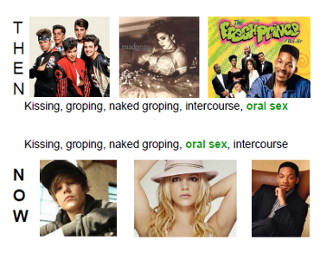 An interesting talk [full transcript in PDF] by Lisa Wade, with title "Promise and peril of the hook-up culture", describes several changes in the last decades with respect to the hook-up culture in campus. On average, during the whole college a student will have 7 hook-ups, 2-3 of them with sexual intercourse. The distribution is obviously quite skewed, with 25% having ZERO hook-ups and 15% having more than 10.
An interesting talk [full transcript in PDF] by Lisa Wade, with title "Promise and peril of the hook-up culture", describes several changes in the last decades with respect to the hook-up culture in campus. On average, during the whole college a student will have 7 hook-ups, 2-3 of them with sexual intercourse. The distribution is obviously quite skewed, with 25% having ZERO hook-ups and 15% having more than 10.
This generation did not invent casual sex, but introduced changes in the way it is practiced. For instance, oral sex used to go after intercourse -- as in the song by Dr. Horrible about sleeping for the second time with someone. Now, the "sexual script" has changed and oral sex goes before intercourse.
Other findings are pretty negative, specially for women. According to their surveys, women are not enjoying much casual sex, and have the impression that the freedom to say yes implies almost an obligation to do so -- often they end up sleeping with people or in circumstances they would have rather avoided.
One of the major findings of the study is that there is little flexibility when choosing how do you want to have sex. The "sex with benefits" kind of relationships or long-term commitments are very difficult because even when there are many who would like to, everyone things the others are against it.
To some extent, the generation has become trapped in a unique way, a unique rule set, about how to have sex, which is generating levels of sexual frustrations that obviously contradicts the whole purpose of these experiences.
 See: transcript / slides / video.
See: transcript / slides / video.